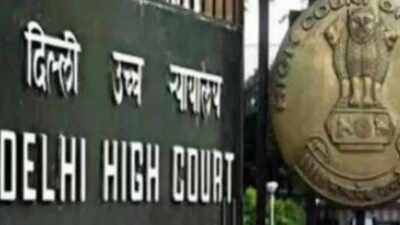Top Searches
- News
- City News
- delhi News
- Be careful before sending summons under criminal law: Delhi high court
Be careful before sending summons under criminal law: Delhi high court

Delhi high court
NEW DELHI: Delhi high court has observed that summoning of an accused in a criminal case is a serious matter and that the criminal law cannot be set in motion as a matter of course.
The high court was hearing a petition filed by a lawyer seeking quashing of the summoning order issued against him on a complaint filed by a real estate development company and its director. The complaint alleged that the petitioner made alterations in the space buyers agreement and committed breach of trust and made improvements to the determent of the complainant in the documents handed over.
Justice Chandra Dhari Singh said that it is not that the magistrate is the silent spectator at the time of recording of preliminary evidences before summoning of the accused, as the magistrate has to carefully scrutinise the evidence brought on record and may even himself put questions to the complainant and his witnesses to elicit answers to find out the truthfulness of the allegations or otherwise and then examine if any offence is prima facie committed by all or any of the accused.
Senior advocate Ramesh Gupta, appearing for the petitioner, submitted that the complainant has failed to make out a prima facie case of commission of any offence under Section 409 of the IPC.
The counsel for the complainant submitted that pre-summoning evidence as well as the other material on record were well appreciated by the trial court and all of the material supported the case of the complainant.
The justice said that the trial court while issuing summons against the petitioner has overlooked the facts that no material is on the record to establish any misappropriation of the money of the escrow account and therefore, the court has passed the impugned order without application of mind.
The high court said, “As per the complaint, there are no allegations that the documents deposited in escrow account have been utilised by the petitioner for his personal gain and advantage, which is one of the essential ingredients of Section 409 of the IPC.”
It further said that the petitioner is a practicing advocate and he has given his professional services to the parties.
The high court was hearing a petition filed by a lawyer seeking quashing of the summoning order issued against him on a complaint filed by a real estate development company and its director. The complaint alleged that the petitioner made alterations in the space buyers agreement and committed breach of trust and made improvements to the determent of the complainant in the documents handed over.
Justice Chandra Dhari Singh said that it is not that the magistrate is the silent spectator at the time of recording of preliminary evidences before summoning of the accused, as the magistrate has to carefully scrutinise the evidence brought on record and may even himself put questions to the complainant and his witnesses to elicit answers to find out the truthfulness of the allegations or otherwise and then examine if any offence is prima facie committed by all or any of the accused.
Senior advocate Ramesh Gupta, appearing for the petitioner, submitted that the complainant has failed to make out a prima facie case of commission of any offence under Section 409 of the IPC.
The counsel for the complainant submitted that pre-summoning evidence as well as the other material on record were well appreciated by the trial court and all of the material supported the case of the complainant.
The justice said that the trial court while issuing summons against the petitioner has overlooked the facts that no material is on the record to establish any misappropriation of the money of the escrow account and therefore, the court has passed the impugned order without application of mind.
The high court said, “As per the complaint, there are no allegations that the documents deposited in escrow account have been utilised by the petitioner for his personal gain and advantage, which is one of the essential ingredients of Section 409 of the IPC.”
It further said that the petitioner is a practicing advocate and he has given his professional services to the parties.
FOLLOW US ON SOCIAL MEDIA
FacebookTwitterInstagramKOO APPYOUTUBE
Looking for Something?

Start a Conversation
end of article










